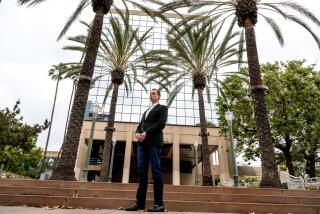Fujitsu Enlists Anaheim Mayor to Fight Trade War Worries
- Share via
Japanese electronics giant Fujitsu, concerned that Japan will be targeted by the United States for unfair trade practices, has enlisted the help of the mayor of Anaheim, where the firm employs 400 people.
Anaheim Mayor Fred Hunter, who will testify today in Washington at an International Trade Commission hearing, said Tuesday he is concerned that the future of the Fujitsu telecommunications plant may be in jeopardy because of the brewing international trade battle between the United States and Japan.
“People in Anaheim should not have to lose their jobs because of trade retaliation,” Hunter said.
Fujitsu said it believes telecommunications products of the type it manufactures are likely to be included on the Super 301 list being prepared by the Bush Administration. The so-called Super 301 lists, mandated by the Omnibus Trade Act that Congress passed last year, are intended to set priorities for attacking other countries’ unfair trade practices.
Despite the concern of Fujitsu and Anaheim city officials, any sanctions that would affect the company are probably years away. The Bush Administration has said that the list is designed only to start negotiations intended to convince a country to open certain markets. Under the law, a country would have up to two years to meet U.S. demands, and retaliation would not be certain even after that time.
“Super 301 is simply a way of designating a particular commodity or country as needing, shall we say, some persuasion to liberalize their trade practices,” said John R. Liebman, a Los Angeles attorney specializing in trade law. “It sets into motion a negotiations process that Congress believes will likely result in resolution of that particular trade problem.”
Liebman said telecommunications has been a particular sore spot in U.S. and Japanese trade relations and that U.S. companies have been pressuring the Bush Administration to include telecommunications products on the Super 301 lists.
“But that doesn’t necessarily mean that retaliation will automatically follow,” Liebman said. “I think it’s premature to call the rescue squad.”
Plans to Expand
Nevertheless, Fujitsu officials say they are concerned about possible retaliatory action by the United States. In fact, the company was so concerned it dispatched the president of its U.S. subsidiary, Fujitsu America, to Anaheim to meet with Hunter.
Fujitsu American President Yasushi Nakamura told Hunter that the company would like to remain in Anaheim and plans to expand its local operation after it introduces a new PBX product in July. But that expansion may not occur if the company is hit by sanctions. “I need your help,” Nakamura told Hunter.
Nakamura said the sanctions could also affect a Fujitsu telecommunications plant in Dallas and a computer chip factory near Portland, Ore. The Japanese company also has enlisted the help of former Oregon Gov. Victor G. Atiyeh, who will speak on the firm’s behalf at today’s International Trade Commission hearing.
Hunter said he understands that the U.S. action is an attempt to correct a huge trade deficit and pressure other countries to open their markets to American goods. And he said he also knows that by opening up foreign markets to U.S. goods, American workers might benefit from additional jobs in export industries.
But he added: “I’m the mayor of Anaheim and I’m looking after my city. Those 400 families that might be put out of a job, who’s going to tell them about export jobs.”
Fujitsu sought the mayor’s help to try to stave off any trade sanctions that might affect its Fujitsu Business Communication Systems subsidiary in Anaheim. The unit manufactures business telephone systems known as private-branch exchanges, or PBXs.
If the Bush Administration eventually decides to slap stiff tariffs on PBX products from Japan, then Fujitsu would have to consider closing the plant, Fujitsu officials said Tuesday.
“If our costs double or even go up by 50% as a result of arbitrary retaliation, then we’re not going to be able to compete,” said Jose Reines, president of Fujitsu Business Communication Systems.
More to Read
Inside the business of entertainment
The Wide Shot brings you news, analysis and insights on everything from streaming wars to production — and what it all means for the future.
You may occasionally receive promotional content from the Los Angeles Times.










